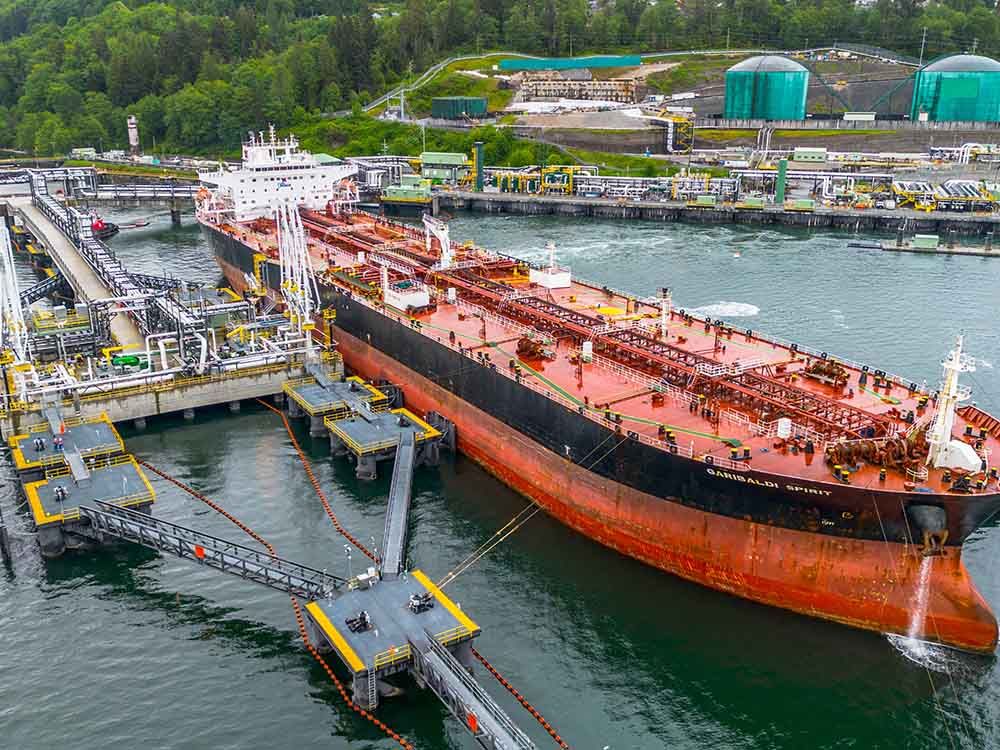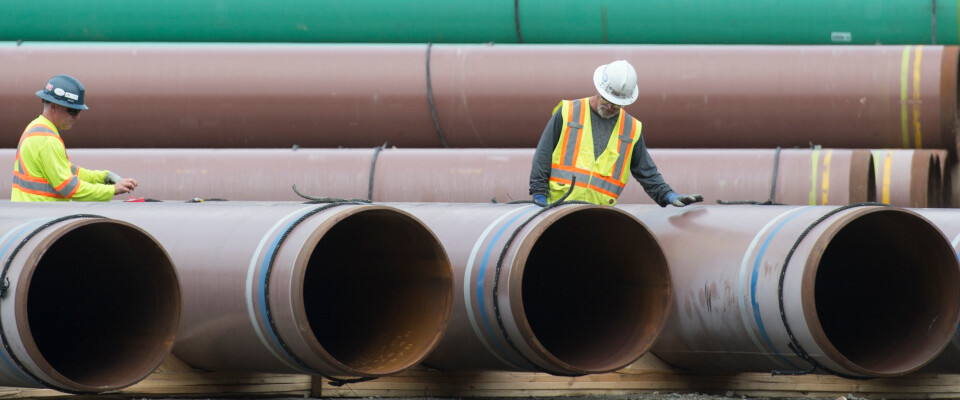Interesting article from Trevor Tombes on TMX.
You are using an out of date browser. It may not display this or other websites correctly.
You should upgrade or use an alternative browser.
You should upgrade or use an alternative browser.
Calgary & Alberta Economy
- Thread starter Oddball
- Start date
darwink
Senior Member
Doesn’t need it.Question for those in the know, how long would it take to twin the Trans Mountain Pipeline? I’m making the assumption trimming an existing route would be the quickest right?
The docks and harbour max out at a ship a day, around 550k barrels a day. There is more than enough capacity in the existing lines (with some more pumps) to even double that.
A spur to another dock is needed. That dock couple be anywhere on the west coast.
Mountain Man
Senior Member
The pipeline we need is one that goes east. What % of eastern Canadian oil and refined products are OPEC or American?
Yeah, it blows my mind that the massive Irving refinery takes Saudi oil, and nobody in the east seems to care.
darwink
Senior Member
Until today, american imports were incidental only. Basically Alberta sells light crude elsewhere in the USA for more money, and Ontario and Quebec import light crude from the USA for less money that is picked up by the Enbridge mainline along the way.The pipeline we need is one that goes east. What % of eastern Canadian oil and refined products are OPEC or American?
That can change somewhat easily, but doesn't matter. The market will work itself out as long as the USA doesn't shut down trans-shippment of Canadian oil to Sarnia. That is the real risk.
New Brunswick also doesn't matter, since it is on the ocean. Converting New Brunswick to Canadian crude doesn't help Alberta, anymore than being to sell that block of Canadian crude somewhere else.
We have a lot of public policy issues going on, but going to New Brunswick for energy east was a policy choice, and seen as a way to reduce regulatory issues (an existing VLCC port) versus a loading port on the St Lawrence with stupid beluga whales, and avoiding most ice issues.
If Canada has the opportunity to build pipelines to the west coast, it makes no sense at all to build a pipeline to New Brunswick if that capacity can go west instead.
Here is the % flows:
and the barrels
DougB
Senior Member
Doesn’t need it.
The docks and harbour max out at a ship a day, around 550k barrels a day. There is more than enough capacity in the existing lines (with some more pumps) to even double that.
A spur to another dock is needed. That dock couple be anywhere on the west coast.

'Northern Leg' to Trans Mountain pipeline attracts interest amid brewing trade war
An old proposal to build a northern branch off the Trans Mountain pipeline is attracting interest as a response to trade headwinds. Read on.
darwink
Senior Member
From a 1970s report (this was about importing oil, not exporting oil):
'Northern Leg' to Trans Mountain pipeline attracts interest amid brewing trade war
An old proposal to build a northern branch off the Trans Mountain pipeline is attracting interest as a response to trade headwinds. Read on.financialpost.com
Canada. Working Group on West Coast Deepwater Oil Ports. (1978) Potential Pacific Coast oil ports: a comparative environmental risk analysis. Vancouver, B.C.: Fisheries and Environment Canada. Available at: https://publications.gc.ca/collections/collection_2021/eccc/Fs77-6-1978-1-eng.pdf [Accessed 2 March 2025].
Whipped up a more legible version:
Last edited:
DougB
Senior Member
Somehow the "Great Bear Rainforest" isn't on that map and the routing for Northern Gateways wasn't novelFrom a 1970s report (this was about importing oil, not exporting oil):
View attachment 634549
Canada. Working Group on West Coast Deepwater Oil Ports. (1978) Potential Pacific Coast oil ports: a comparative environmental risk analysis. Vancouver, B.C.: Fisheries and Environment Canada. Available at: https://publications.gc.ca/collections/collection_2021/eccc/Fs77-6-1978-1-eng.pdf [Accessed 2 March 2025].
Whipped up a more legible version:
View attachment 634555
darwink
Senior Member
They acknowledge further work would be needed to properly weigh pipeline routes.Somehow the "Great Bear Rainforest" isn't on that map and the routing for Northern Gateways wasn't novel
The parks and areas that became the Great Bear RainForest are mentioned.
plus
Attachments
DougB
Senior Member
I was thinking along the lines of drastically reducing the requirements and therefore the required work and resources. Do more rigorous approval processes actually lead to more predictable outcomes? My guess is "no". Do more rigorous approval processes lead to fewer political considerations? My guess would be that they make the situation worse.It doesn't work out that way. Instead, when problems happen, both sides motion to stop the clock. If the government had resourced panels with huge amounts of money, maybe it could have happened, but simultaenously they were trying to cut the budgets of NRCan, EC and associated agencies. Really tried to have it all ways, the fundamental public policy error, trying to go faster for less money. The majority term of the Harper government was full of own goals from believing their own talking points.
darwink
Senior Member
There is a balance to be had. Certainly we don't exercise 'proportionality' enough. TMX if had done better geotech surveys and better cataloging of migratory birds ahead of time, would have saved a year, maybe 2. I do think the government should step up and pay for a larger part of the process to enable faster decisions. There also needs to be a better rubric for breaking down issues. What is a show stopper? What is a mitigate by spending up to $1 billion? What is a mitigate for $100 million? When there isn't a clear decision maker, from either the government or the proponent, who can say 'we will do this' or 'we won't', things go sideways. There was a first attempt to do this after the courts rejected TMX. The government did this, then the courts accepted the crown could build TMX despite a lack of unanimity.I was thinking along the lines of drastically reducing the requirements and therefore the required work and resources. Do more rigorous approval processes actually lead to more predictable outcomes? My guess is "no". Do more rigorous approval processes lead to fewer political considerations? My guess would be that they make the situation worse.
Honour of the Crown is a big thing. Not knowing, because we didn't even look into it, is grounds for tossing approvals.

Alberta is eating B.C.’s lunch when it comes to tech and talent - The Logic
Tech workers and companies are being lured to Alberta by lower taxes and cheaper housing. One B.C. business group wants that to stop.
 thelogic.co
thelogic.co
Interesting article that's not a typical rah-rah, with a lot of the article from BC's perspective. Still a ways behind Vancouver, but Calgary's tech sector getting some decent traction and getting noticed from the folks in BC.
Tarsus
Active Member
So here’s a big question. Come April 4, are we going to see the price of our heavy crude drop by 10% so US buyers can pay the same price? Or do we stand firm on our price, and chance that US will continue to buy a lot of it, but also bring in some from other countries like Mexico or Venezuela?The price could drop enough if lets say, 300,000 barrels a day that make it to the gulf today, couldn't, and were also banned from re-export. In that situation, either the competition bureau has to allow the different companies to form a cartel to support price, the Alberta government needs to impose curtailment, or the federal government needs to impose an export tax. A significant enough price drop could leave a $10 billion deficit on the province's books, and wipe profits from the energy companies.
Personally I hope we stand firm on the price and see what happens. If we drop it by 10% I Would expect Trump to later bump the tariffs higher and see how high of a discount he gets.
If we stand firm we may end up losing the export of those 300k barrels or more, but we can then see how things play out. If we can hang in there long enough to cause some blowback from Americans, Trump might back off on oil tariffs altogether. I mean losing 300k barrels a day is roughly the same as losing 10% on the price right?
trtcttc
Senior Member
These commodities are market traded, so you can see the price differentials. As of right now, West Texas Intermediate (WTI) is trading at $67.34 and Western Canada Select (WCS) is trading at $55.93, a differential of $11.41, near an all-time low. WTI-WCS differentials used to be around $18, but fell significantly last year due to TMX to $14.50, and was supposed to keep falling to $13. The smaller the differential, the more valuable our oil is. This is really just an argument that we are in control of our destiny (Canada as a whole), Building a pipeline wholly within Canada has had more effect on prices than any tariff.So here’s a big question. Come April 4, are we going to see the price of our heavy crude drop by 10% so US buyers can pay the same price? Or do we stand firm on our price, and chance that US will continue to buy a lot of it, but also bring in some from other countries like Mexico or Venezuela?
Personally I hope we stand firm on the price and see what happens. If we drop it by 10% I Would expect Trump to later bump the tariffs higher and see how high of a discount he gets.
If we stand firm we may end up losing the export of those 300k barrels or more, but we can then see how things play out. If we can hang in there long enough to cause some blowback from Americans, Trump might back off on oil tariffs altogether. I mean losing 300k barrels a day is roughly the same as losing 10% on the price right?
Price differentials due to TMX: https://www.aer.ca/data-and-perform...ta-energy-outlook-st98/prices-and-capital-0-1
Real-time prices: https://www.oilsandsmagazine.com/en...me-oil-prices-wti-brent-wcs-energy-stocks#CCI
Historical average from AB Gov: https://economicdashboard.alberta.ca/dashboard/wcs-oil-price/
DougB
Senior Member
Biden, Obama, Trudeau and the governments of BC and Quebec were greater threats to Alberta's economy than Trump






